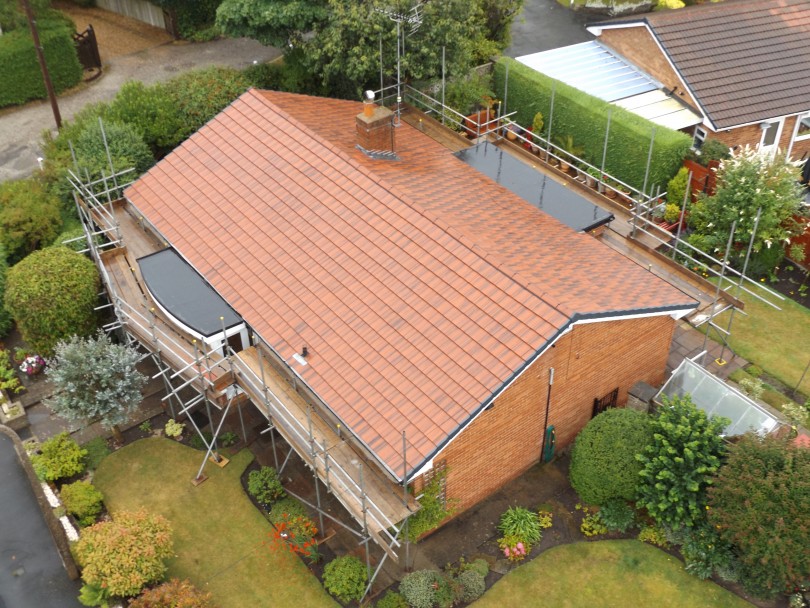Renewing Your Roof?
Furber Roofing Limited are the reroofing specialists covering Wallasey, Wirral, Liverpool, Chester & North Wales; with almost sixty years in the roofing business, a great team of experienced tradesmen, our own in-house scaffolding division and a whole host of trader scheme awards and amazing reviews; let us take care of all your roofing problems.
A few of our clients in Wallasey, Wirral and Liverpool have asked us what renewing a roof would involve so we thought it would be useful to post the following guide on what to expect.
What does renewing a roof involve?
At some stage in a pitched roof’s life it is going to need more than just minor roof repairs. A well constructed pitched roof can last 50 years and longer but if a couple of lead valleys have gone, a few ridge tiles have cracked, some individual tiles or slates have slipped and there are leaks or condensation appearing in the loft then it may be time for a full refurbishment of your roof.
Furber Roofing Limited covering Wallasey, Wirral, Liverpool, Chester and North Wales offers a 10year written guarantee on all Reroofing and Reslating works and are also members of NFRC and the Competent Roofer Scheme which means we can sign off the majority of our reroofing works under the Competent Roofer Scheme thus saving our clients hundreds of pounds in Building Control inspection costs.
Pitched Roof Construction
Creating a new roof on an existing house involves:
- Erecting scaffolding and ladders to eaves level
- Stripping off and removing old tiles including ridge tiles and hip tiles along with mortar from ridges / verges (setting aside good tiles for reuse)
- Removing old wooden battens, removing from site and disposing of in skip
- Remove any lead from valleys
- Removing old roof felt from site to dispose of in a skip
- Checking wooden rafters and joists are sound. Replace any that are rotten. Remove /hammer down all protruding nails
- Add new breathable membrane
- Add new treated wooden battens at correct spacing
- Put on new tiles or slates or re-use old ones.
- Add roof ventilators if required for bathroom extractor fan
- Create new valleys (joins between roofs) with new code 4 lead or GRP
- Bed down any ridge tiles with mortar and bed down tiles on verges or alternatively all ridge and hip tiles are mechanically fixed using a dry ridge system.
- Add thermal insulation between rafters if cold roof (or lay insulation on floor of loft if cold roof)
- Remove scaffolding and leave site in tidy condition
- Remove skip (if on site)
It is assumed here that the rafters and joists are reasonably sound. Where these all need to be replaced then there will be an additional cost for new roof trusses.
Additional repairs that can be done at the same time include:
- Replacing rotten fascia’s, soffits and bargeboards
- Painting fascia’s, soffits and bargeboards (using the scaffolding for access)
- Replacing guttering
A new roof can mean all new roof tiles or slates or it may involve replacing those tiles which are damaged or have little life left in them. Clay tiles and slates can last for 100 years or more and concrete tiles 50 years plus. If the majority of the tiles are still usable then the ones that are damaged can be replaced with reclaimed tiles…
Major factors which contribute to the cost of a new roof are:
- The area of the roof in square meters
- The material used for the roof covering
- Ease of access to the roof – bungalows will cost less as the scaffolding costs will be much lower
- The complexity of the roof – how many valleys, hips and chimneys are there
- The amount of roof tiles that are to be reused – depending on the state of the tiles often 60-80% of the clay tiles on a roof can be reused. A roof with 100% new tiles will cost more.
Costs for reroofing will vary for every property according to size and design; also access can be critical to carry out the works in a safe and professional manner. Scaffold is a Health and Safety requirement. Timescales of between one week and one month are normal depending on the size and complexity of the property however the property will be kept dry at all times.
If you are based in Wallasey, Wirral, Liverpool, Chester or North Wales and require a free quotation and survey please do not hesitate to contact us on 0151 691 2978

